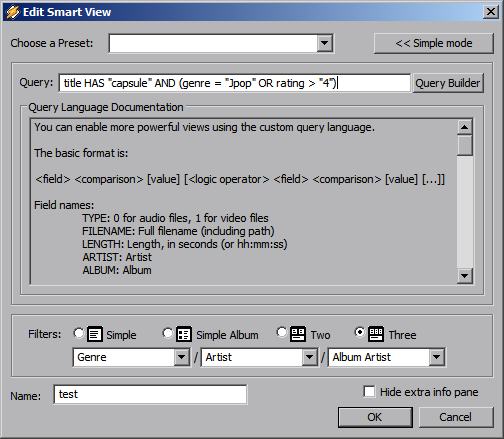Winamp vs iTunes vs MediaMonkey

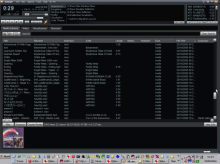
WINAMP v5.5 |

ITUNES v7.6 |

MEDIAMONKEY v3.0 |
It's been almost three years since we
last reviewed and compared these three giants. A lot has changed since then. Thanks to the popularity of our last comparison, we've 1-upped ourselves, and put the latest versions of MediaMonkey (3.01), iTunes (v7.6) and Winamp (5.51) head to head for another battle extraordinaire. All three players have been feature enriched and it's not all that obvious which is the winner this time.
A big thanks to all the people who have helped iron out some errors, typos, and missing features in the old page. We've taken into account all your suggestions, from emails, forums, and boards, so this new rematch should now be more accurate and comprehensive. As before, we will focus on the basic operation, including file types, searching features, tagging, and the speed of the program. Less emphasis will be put on things like video, podcasting, and store shops, but they will get a look at least.
As before, we have our top 3 contenders:
 Winamp
Winamp (v5.51) -
Download latest (previously reviewed 5.02).
 iTunes
iTunes (v7.6) -
Download latest. (previously reviewed 4.7).
 MediaMonkey
MediaMonkey (v3.01) -
Download latest (previously reviewed 2.3).
Contents
- General operation and screenshots
- File type support
- Searching
- Interface speed
- Library maintainance
- Tagging
- Bloatware analysis
- Miscellaneous issues
- Extras
- The Winner
General operation
Preference of basic program design can be very tricky to judge, since so much comes down to habit, familiarization, and also what exactly you want from your music program. While I can't claim to speak for the tastes and needs for everybody, I will try and establish some fundamental design philosophies of each program, as well as any needless operational quirks or inconsistencies.
It can be said that each program works roughly similar. You have the main full screen window and alternatively, various 'mini' versions which can be perched in the screen corner so you can for example adjust the volume, skip a track, or pause a song while browsing the web.
First some shots...
WINAMP
 |
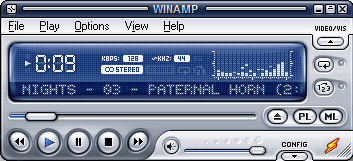 | 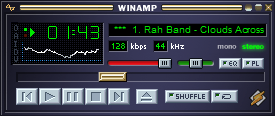
ABOVE: The classic, fast view for nostalgia and speed demons.
LEFT: The more recent mini view |

ABOVE: The latest skin - "Bento". |
Winamp (and Mediamonkey), has loads of skins available for download if you're not happy with the ones you get as standard.
MEDIAMONKEY
Mediamonkey also offers a "MicroPlayer" (not shown), as well as the usual "MiniPlayer". This reduces Mediamonkey to the system tray. A simple right-click will prompt a handy mini-menu to control the player. Nice!
ITUNES
I've already stated how the ideal player would work with the idea of an 'inbox' system. None of the players support
It can be a right pain in the neck to resize frames inside Mediamonkey. Winamp and iTunes allow much more leeway for mouse accuracy when resizing.
On the other hand, Winamp's scroll handles when are always small, even if you only need to drag one more line up or down, or one character left/right.
File type support

iTunes supports (and converts out to) CDA, MP3, AIFF, WAV, AAC/MPEG-4, Apple Lossless, and (read only) M3u, PLS. According to Wikipedia, in theory it should also read in Apple's QuickTime supported formats such as AU and AVI formats amongst others, but my copy of iTunes failed to import those files into the library (MIDI made it through though). OGG is supported if you install the
appropriate plugin.

Mediamonkey comes second place to Winamp. Like iTunes, MP3, AAC, and WAV are supported as well as OGG/Vorbis, FLAC, WMA, APE, MPC, CD audio (CDA), M3U, PLS, ALAS - all as standard. But a
simple plugin will allow you to read rarer formats such as VOC, AU, SND, AIF, AIFF, AIFC, IFF, SVX, AUD, and VOX. You may also be able to utilize many of Winamp 2's plugins to support more formats; see
this thread, and especially
this site for a decent list. (not all is smooth though - I sucessfully managed to get various types of MODs working, but MIDI fell short - having a stuttering sound).
Finally, MM will convert to OGG, MP3, WMA, or WAV, and retain tag information in most cases.

Most Winamp fans will probably be chuckling away at this point. Winamp supports more formats by far than either MediaMonkey or iTunes. As standard, it can read in (deep breath): 669, aac, aif, aiff, amf, asf, asx, au, avi, b4s, cda, far, flac, it, itz, kar, m2v, m4a, mdz, mid, midi, miz, mod, mp1, mp2, mp3, m3u, m3u8, mp4, mpeg, mpg, mtm, nsa, nst, nsv, ogg, okt, ptm, pls, rmi, s3m, s3z, snd, stm, stz, ult, wav, wma, wmv, wpl, vlb, voc, xm, xmz.
Yeah, quite a few. For those who want to listen to music in even more obscure formats, then there are countless
Winamp plugins available (.sid, .vgz or .sgt anyone?).
Lowdown for File type support
Winamp


 Mediamonkey
Mediamonkey

 iTunes
iTunes

So the first round knockout goes to Winamp! But the days are early...
Searching/Filtering
Winamp, iTunes and MediaMonkey can search one or more keywords, rummaging deep inside the metadata to see if any matches appear.
However, MediaMonkey goes DEEPER. For a specific keyword ("konami"), I searched through the 6000 odd music files on my HD, and MediaMonkey found 69, while Winamp and iTunes only found 42 files (the same 42). After some research, I found out that MediaMonkey searches *all* data inside the MP3 ID tag (despite not having these tags available for view!). This proved decisive in fields such as "orig. artist", "copyright", "encoded" and "url" etc. which iTunes and Winamp ignored (actually iTunes managed the "url" field).
Standard search
iTunes, can also search according to Artist, Album, Composer and Song, fewer than MediaMonkey. Unfortunately for iTunes though, the filename goes ignored in any search.
Winamp can't really search in any special criteria using the simple search. At least it can handle phrase searching (ala Google) though. Unfortunately, iTunes still can't. (This wouldn't necessary be a problem for the casual collector, but when you start to build up tens of thousands of files, then making sure the words are in the correct order can filter down hundreds to just a few candidates).
It's good to see that MediaMonkey can now look in all tags for multiple keywords (and not force phrase searching). Perhaps they took notice of what we said last time! Mediamonkey also supports searching through (many, not all of the) individual attributes, though with a few more clicks, the other two can manage that also if you see below...
Smart Automatic Playlist Viewstm
Each player has their own version of the so-called "Smart-list". Winamp calls it a "Smart-view", Mediamonkey call them "AutoPlaylists", and iTunes claims them to be "Smart Playlists". Whatever they're called, they are great tools to filter down your giant collection to suit a mood or occasion. All three players allow you to filter by various attributes, and each can combine these conditions to allow sophisticated filtering. Let's take a look at each one in turn:
WINAMP
Winamp has probably the most advanaced search/filtering system out of the three. As well as the usual attribute and operator filters, Winamp boasts a logic-complete query system allowing you to use brackets on top of AND, OR and NOT. This allows subtle filtering possibilities that just aren't possible with the other two MP3 players.
That's the good news. The bad news though is that Winamp doesn't support the "Any" tag, so it won't search in all attributes, only each tag individually. iTunes suffers the same problem, and it's fairly unforgivable. Also, the filename and extension tags aren't supported (despite them being tags in the library view). Silly oversights.
Finally, all three players can open up sub-lists so you can see the Genre, Album, and Artist seperately from the main list. But Winamp goes a step further and allows any combination of Genre/Artist/Year/Publisher/Album art etc. to appear.
ITUNES

iTunes allows all the attributes to be searched, and also features nice autocomplete functionality for the text fields. Only standard playlists allow tracks to be dragged higher or lower, this isn't allowed with iTunes' Smart Playlists.
MEDIAMONKEY
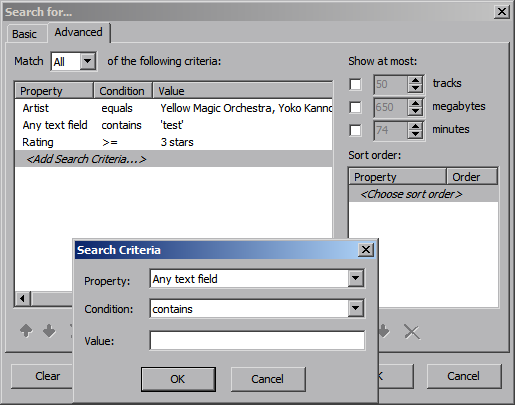
The free version of Mediamonkey allows you to search through a lot of the important attributes. If you want the full searching power available, then the Gold version (about $20) will bring up this window you can see above. A nice touch is the ability to sort the final list according to an attribute.
Synopsis
It's clear that this round is much more even. Unfortunately, it would seem that none of the players support the full use of wildcards or regular expressions. Using "*" to replace a letter, or "**" for the rest of a word, or *** for any amount of letters, isn't possible with any of them. Finally, even Winamp can't support OR, AND, or NOT in the regular non-smartview search.
Lowdown for Search:
Mediamonkey


 Winamp
Winamp


 iTunes
iTunes


Mediamonkey gets a strike back, but iTunes is still lagging behind. Let's see how they all fare in terms of speed...
Interface speed
This one can be a little tricky to judge. For testing, I used a Pentium M 1.3 Ghz processor, with Windows XP, and 1 Gig of RAM. While the following benchmarks may not translate proportionally to every system, it should at least give a good idea of what to expect roughly.
For this challenge, we will concentrate on Playback, Scrolling, Searching, and Track switching speed.
Playback speed
For this first speed benchmark, I tested running various MP3s through each player to see how efficiently they could be played. This can be rather tricky to break down because of various 'CPU spikes' in the data which should also be taken into account, so we've grabbed the stats from XP's CPU usage history.
| Winamp |
The pick of the bunch, Winamp performs admirably with around 5% of CPU time being eaten on average.
 |
| MediaMonkey |
MM comes second place, using 8% of the CPU time on average.
 |
| iTunes |
iTunes comes last swallowing up something around the 15% CPU mark. But there's more...
 |
iTunes
(mini view) |
You would really think the mini view from iTunes would be faster than the large view, but guess what... it can often be slower still, thanks to the scrolling text in the information box.
 |
MediaMonkey
(mini view) |
Unfortunately, Mediamonkey won't allow a mini mode in the fast Windows theme 'skin', so you need the souped up skins if you want it compact. Anyway, there's absolutely no excuse for Mediamonkey to be this slow. Even the full screen view of the souped up skin is faster than this.
 |
Scrolling speed
Now let's test scrolling through the library, iTunes was by far the slowest again. For this comparison, I tested scrolling 9 columns of data, used the fastest skin available to each player, and also roughly halved the speed of my PC (speedstep) for more accurate testing (each benchmark is estimated according to my rather good ability to judge frame rates).
iTunes spluttered out a magnificent (cough) 5 frames per second.
Winamp churned out a much more respectable 30 frames per second.
But MediaMonkey came top with a winning 40 frames per second!
Searching speed
Finally, another important speed statistic is the searching. Here, Mediamonkey came bottom, performing the search in a slothful 1 second (but typing whilst the list updates is as smooth as silk). Winamp was closer to half a second (again, typing is smooth). Finally, iTunes is.... astonishingly the winner here, with roughly a quarter of a second taken for each search (typing can be a little less smooth however).
Track switching
In Mediamonkey and iTunes, there's an awkward delay of around a second between songs when you're double clicking files from the Windows folder. That may be okay for many of you, but when you're used to the lightning speed of Winamp, it feels horrible (and yes, I did turn cross-fade off etc. to test).
iTunes takes around half a second to continue when pausing/unpausing a song - awful!
Winamp takes a while, sometimes even up to a second to play a tune if you double click it from the main library list, even with the Classic skin. (From the playlist is okay though.)
Other speed issues
iTunes takes a while (0.25s - 1s) when switching between left panel selection (playlist/library/video/iTunes store etc.).
You have to go through a window to clear the search field if you want Mediamonkey to show the whole library.
Lowdown for Interface speed
Winamp




Mediamonkey


iTunes

So far, so bad for iTunes. It's still early days yet though, so everything still to play for...
Library maintainence
iTunes differs in a fundamental way to the way it keeps track of music files in the main library compared to MediaMonkey or Winamp. In a nutshell, when you load/play a new music file (MP3 or whatever) through iTunes, that file is automatically added to the library. With Winamp or Mediamonkey however, a rescan of your entire music folder is needed each time you want the library up to date.
iTunes' approach is preferable, but here's the catch. Obviously, if you delete a file in your Windows music folder, then iTunes would still contain the file in its library. Unfortunately however, iTunes is unable to delete the file internally, so you need to do two actions to completely remove a file. Apple probably assumes that whatever file you download, you want to keep forever. The only way to semi-solve this would be to highlight all files in your library, delete them all, and then get iTunes to rescan your music folder/s.
As discussed in the previous article we did many moon ago, the best possible system would utilize what I can an 'inbox' or 'To Check' list. In a nutshell, any new files you've downloaded are automatically added to the inbox, ready for you to rate, add metadata, notes and whatever else. From the 'inbox', you would be able to archive any file to the main library, or delete it permanently. This solves the problem of cluttering up your hard drive with files you don't need as well as keeping a selection of files you've just downloaded recently. It's also a great way of making sure that MP3s which aren't initially tagged don't get forgotten about forever.
As I write this, I know of no such player exists that implements this feature in its purest form, but out of the three programs under review, it would seem that Winamp comes the closest. It is possible to create a temporary playlist as the 'inbox' list, and then every time you wanted to move a file to the main library, you would select "Send To -> Add to Local Media". It isn't perfect, because it would have been nice to edit or at least view the metadata inside the playlist view itself. Once we've got to that stage, it's then possible to unify the 'inbox' view with the main library view, and then toggle between these with a tab or something. Oh well, maybe for a future version...
Note to Mediamonkey: Allow adding playlist files to library!
Note to iTunes: Don't add to library unless I specifically ask!
Note to Winamp Allow us to see metadata inside the playlist view!
Apple should be commended for providing a non-propriety XML format for iTunes' music library ("iTunes Music Library.xml"). If you want to access all the metadata that iTunes shows (including iTunes only data, like rating, play count, and last played, and rating, which are not part of the ID3v2.3 format), for whatever purposes, then you can. I'm not sure that Winamp and Mediamonkey are so obliging.
One final thing; ideally, each player should unify the playlists with the "smartlists", so that each playlist can also be filtered according to criteria, and each smart playlist can contain arbitrary tracks like a playlist.
Mediamonkey

Winamp

iTunes

One apiece - now on to tagging...
Tagging and metadata
Mediamonkey  |
iTunes  |
Winamp 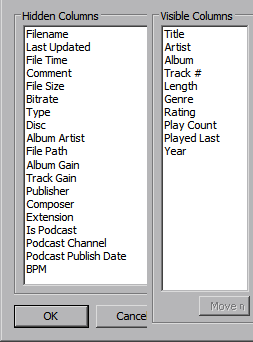 |
They each have all the most important attributes, but excuse me while I begin with a rant....
<rant mode>
WINAMP AND ITUNES, CAN YOU *PLEASE* SUPPORT CUSTOM TAGS?!! IF WE WANT TO ADD OUR OWN ATTRIBUTES TO MUSIC, ONLY MEDIAMONKEY ALLOWS US TO DO SO. GET A CLUE STICK, AND GET IT SORTED - (YOU'VE HAD AGES).
</rant mode>
Let's rank some tags by order of how roughly important they are, and see which player lack any:
| MediaMonkey | Winamp | iTunes |
| Title | * | * | * |
| Artist | * | * | * |
| Rating | * | * | * |
| Album | * | * | * |
| Timestamp | * | * | * |
| Date | * | * | * |
| Played # | * | * | * |
| Comment | * | * | * |
| Last Played | * | * | * |
| Date Added | * | | * |
| File name | * | * | |
| Extension | + | * | |
| Genre | * | * | * |
| Length | * | * | * |
| Last updated | * | * | * |
| Composer | * | * | * |
| BPM | * | * | * |
| FilePath | * | * | |
| Track # | * | * | * |
| File size | * | * | * |
They have most of the important tags. Winamp forgets the "Date Added" tag, which may be useful. iTunes on the other hand lacks proper extension info (many filetypes are lumped under the category "QuickTime movie file", whether it's a MIDI or MOV - typical). iTunes also lacks the Filename and Filepath which we spoke about earlier (to see the file+path wouldn't be important in the long run, but in the initial stages, it's very handy to see where the file is so you can add tag info more easily).
One thing to mention is how Mediamonkey has 11 rank values instead of the 5 stars for iTunes and Winamp. This gives much more legroom for distinguishing your "incredible" tracks from the merely "excellent" ones. It sounds trivial, but believe me, when you have tens of thousands of tracks, and love music enough to know how the quality can differ by several orders of magnitude, you begin to appreciate the extra possible ratings available.
Winamp and iTunes can emulate this by using up the "comments" tag, and putting the ranking inside there. A kludge, but better than nothing.
One other thing that iTunes and Winamp are still lacking which Mediamonkey had from the beginning is the option to not modify the timestamp when updating tags. If you just update say... the album name, the last thing you want is to overwrite when you first saved the file to your HD.
Mediamonkey and iTunes handles multiple file tagging nicely with all the tags available to change. Winamp only presents a few of the tags in this mode unfortunately, but at least it's fast like Mediamonkey (iTunes seems much slower).
Finally, I'm skeptical how well each player handles metadata for particular filetypes. For example, MIDI files leave the comments and author/artist field blank, despite the fact that this data exists in the standard Windows metadata. Often, they would look inside the MIDI for any data, and yes, such data can clash, since each metatag is effectively duplicated, but it should still display both, and give options to unify the tags (batch copy/move a tag to another tag name) to avoid clutter.
Mediamonkey


Winamp

iTunes

Bloatware analysis
This section deals with memory usage, program fluff and HD chomping capability. Traditionally, this is the area where iTunes has always fallen short, but this time, we've been astounded at how spectularly iTunes has surpassed itself.
Hard drive usage:
Winamp does very well on the whole. The install size is a small 8.5 MEG download (and if you're willing to forego a few features, then you can get it even for a a miniscule 2.7 meg!). The 8.5 meg install pans out to a less impressive 31 MB of disk space after installation, but I think that's forgivable considering how many plugins you get as standard.
Mediamonkey is similar to Winamp. The 6.5 MEG install eventually takes up 30 meg of diskspace after installation.
iTunes... well, well, well. After the travesty of the old 4.7 version, we expected the worst, but nothing could have prepared us for the giant 57.2 MEG download we had to endure. But then we installed the program. Apart from taking half an hour, the entire install took up a monolithic 200 MEG of HD space, 70 of which was the iTunes folder itself, 85 of which came with the obligitary QuickTime program install (no I didn't ask), and the rest of the files are littered over folders such as My Documents/My Music/iTunes, Windows/Downloaded Installations, Application Data, Program Files/Common Files/Apple and goodness knows what else. In fact, no fewer than 400 MEG was required while the install was in progress!). Answers on a postcard to this address if you know why they need all this space to cram in the same kind and quantity of features that Winamp and Mediamonkey offer...
Memory usage:
We've explored hard drive space. How about the other bloat factor - system memory? For this, we use the "Total Commit Charge" which supposedly includes both RAM and Pagefile usage together. Here are the results:
MM: 32M (41M with modern skins)
Winamp: 31M (55M for Modern/Bento skin)
iTunes: 80M
Not much between them, apart from iTunes which is around 3 times as bad in this round (like before, iTunes comes with extra 'goodie' processes - "iPodService" and "iTunesHelper", which bump the memory up by about 10 megabyte). Winamp isn't totally innocent either, with its Winampa process, but at least it can be disabled easily (right click the winamp logo in the tray, and select disable).
Mediamonkey


Winamp


iTunes





 Winamp (v5.51) - Download latest (previously reviewed 5.02).
Winamp (v5.51) - Download latest (previously reviewed 5.02). iTunes (v7.6) - Download latest. (previously reviewed 4.7).
iTunes (v7.6) - Download latest. (previously reviewed 4.7). MediaMonkey (v3.01) - Download latest (previously reviewed 2.3).
MediaMonkey (v3.01) - Download latest (previously reviewed 2.3).



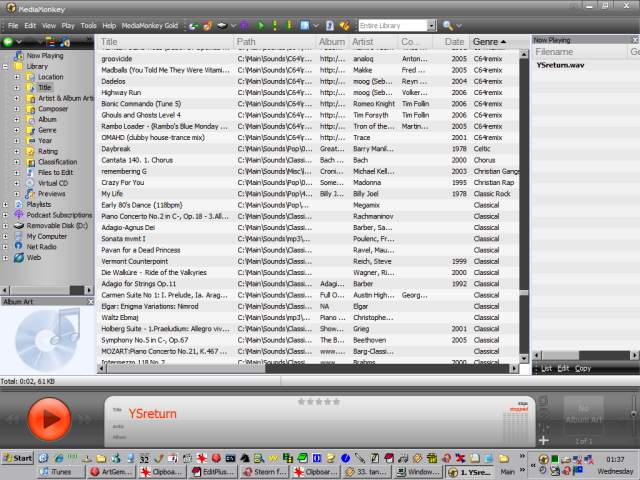



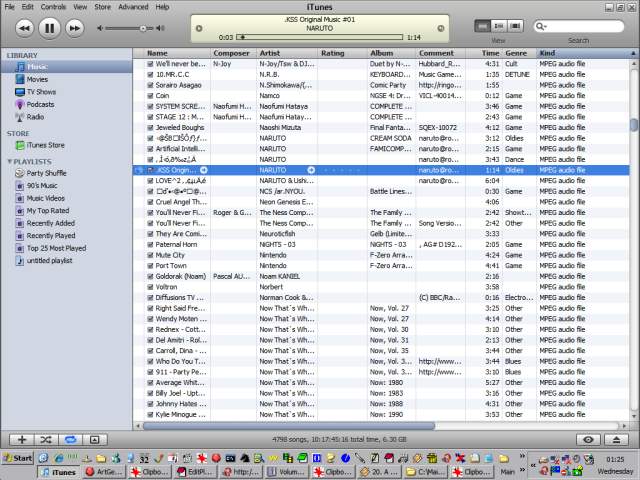

 iTunes supports (and converts out to) CDA, MP3, AIFF, WAV, AAC/MPEG-4, Apple Lossless, and (read only) M3u, PLS. According to Wikipedia, in theory it should also read in Apple's QuickTime supported formats such as AU and AVI formats amongst others, but my copy of iTunes failed to import those files into the library (MIDI made it through though). OGG is supported if you install the appropriate plugin.
iTunes supports (and converts out to) CDA, MP3, AIFF, WAV, AAC/MPEG-4, Apple Lossless, and (read only) M3u, PLS. According to Wikipedia, in theory it should also read in Apple's QuickTime supported formats such as AU and AVI formats amongst others, but my copy of iTunes failed to import those files into the library (MIDI made it through though). OGG is supported if you install the appropriate plugin. Mediamonkey comes second place to Winamp. Like iTunes, MP3, AAC, and WAV are supported as well as OGG/Vorbis, FLAC, WMA, APE, MPC, CD audio (CDA), M3U, PLS, ALAS - all as standard. But a simple plugin will allow you to read rarer formats such as VOC, AU, SND, AIF, AIFF, AIFC, IFF, SVX, AUD, and VOX. You may also be able to utilize many of Winamp 2's plugins to support more formats; see this thread, and especially this site for a decent list. (not all is smooth though - I sucessfully managed to get various types of MODs working, but MIDI fell short - having a stuttering sound).
Mediamonkey comes second place to Winamp. Like iTunes, MP3, AAC, and WAV are supported as well as OGG/Vorbis, FLAC, WMA, APE, MPC, CD audio (CDA), M3U, PLS, ALAS - all as standard. But a simple plugin will allow you to read rarer formats such as VOC, AU, SND, AIF, AIFF, AIFC, IFF, SVX, AUD, and VOX. You may also be able to utilize many of Winamp 2's plugins to support more formats; see this thread, and especially this site for a decent list. (not all is smooth though - I sucessfully managed to get various types of MODs working, but MIDI fell short - having a stuttering sound). Most Winamp fans will probably be chuckling away at this point. Winamp supports more formats by far than either MediaMonkey or iTunes. As standard, it can read in (deep breath): 669, aac, aif, aiff, amf, asf, asx, au, avi, b4s, cda, far, flac, it, itz, kar, m2v, m4a, mdz, mid, midi, miz, mod, mp1, mp2, mp3, m3u, m3u8, mp4, mpeg, mpg, mtm, nsa, nst, nsv, ogg, okt, ptm, pls, rmi, s3m, s3z, snd, stm, stz, ult, wav, wma, wmv, wpl, vlb, voc, xm, xmz.
Most Winamp fans will probably be chuckling away at this point. Winamp supports more formats by far than either MediaMonkey or iTunes. As standard, it can read in (deep breath): 669, aac, aif, aiff, amf, asf, asx, au, avi, b4s, cda, far, flac, it, itz, kar, m2v, m4a, mdz, mid, midi, miz, mod, mp1, mp2, mp3, m3u, m3u8, mp4, mpeg, mpg, mtm, nsa, nst, nsv, ogg, okt, ptm, pls, rmi, s3m, s3z, snd, stm, stz, ult, wav, wma, wmv, wpl, vlb, voc, xm, xmz.






